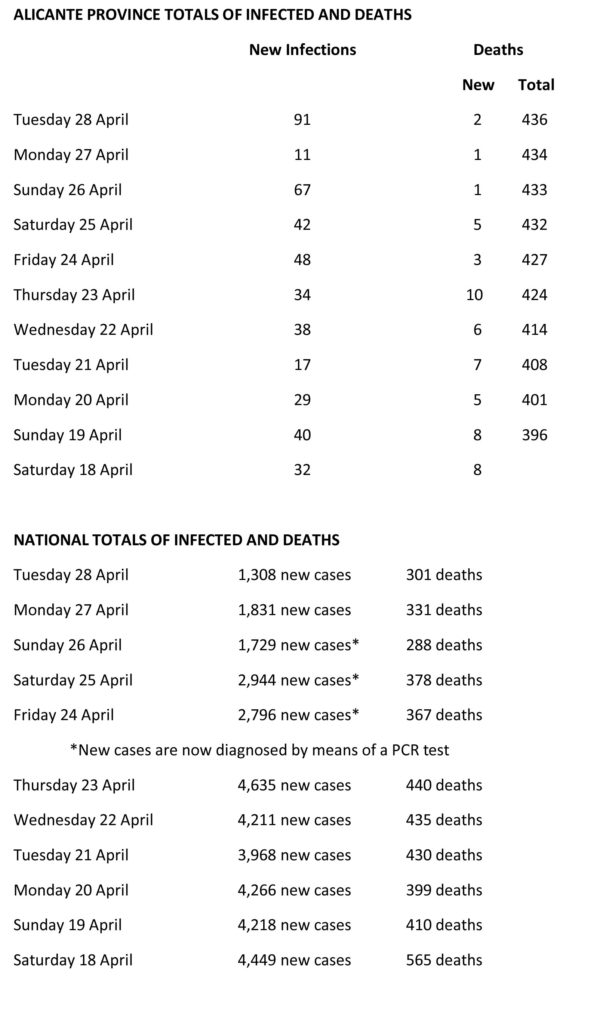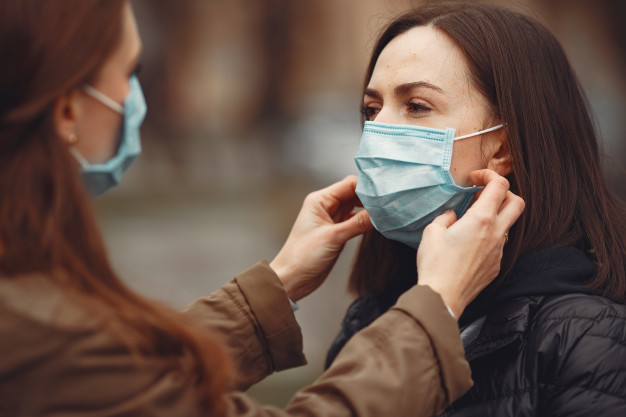The last 24 hours has shown another reduction in the number of victims and daily infections in Spain.
Figures announced on Tuesday morning show a further 301 dead and 1,308 new cases in the last 24 hours in Spain.
The Ministry of Health confirms a total of 23,822 deaths and 210,773 COVID-19 infections throughout the country.
Further good news is that 102,548 people have now been discharged from hospital after overcoming the disease, including 1,673 that have recovered in the last hours. It is the fifth consecutive day with higher discharges than new cases.
The communities hardest hit by the virus continue to be Madrid with 13,080 deaths and Catalonia, 9,923, with Castilla-La Mancha ranking third, while those least affected are Ceuta, Melilla and the Region of Murcia.

Valencian Community
In the last 24 hours, 246 new cases have been registered in the community, 147 of them in Valencia, and 12 deaths.
The Minister of Health, Ana Barceló, confirmed the new totals 11,658 positives and 1,206 deaths since the pandemic broke out. There has also been a further 106 discharges since yesterday, and the number of admissions continues to decrease, ten less than yesterday.
Barceló said, only a very low percentage of the new cases are being recorded: “The percentage of admissions continues to decrease, 14% of the total number of cases, while the number of those admitted also continues to decrease in both ICUs and hospitals”. In this regard, there are currently 753 patients admitted to Valencian hospitals with covid-19, ten fewer than yesterday. ICU admissions are 139 in total, also ten less than yesterday.
There have been 106 new discharges, so the total number of patients cured in the Community is now 6,426.
Half of the deaths in the last 24 hours have been in nursing homes, six of the 12 deaths, so the pandemic has now claimed 1,206 lives in the Valencian Community. By provinces, 8 people have died in Valencia, 2 in Alicante and 2 in Castellón.
By provinces, the most new cases have been registered in Valencia, 147 of the total of 246, while in Alicante 91 new cases have been confirmed and in Castellón 8.
In the province of Valencia there now 499 people admitted, 71 in ICU, 167 in Alicante, 54 of them in ICU; In Castellón there are 87 patients admitted, 14 of them in ICU.
The situation of care residences has improved slightly in the last 24 hours and there are now three fewer nursing homes with infected people. There are currently positive cases in 89 Valencian residences, while 31 of them are under active surveillance, two fewer than yesterday. By province, there are 14 residences under surveillance in Valencia, 9 in Castellón and 8 in Alicante.
Easing of Confinement
Right now, the focus of the authorities and experts is on de-escalation. In this respect Alicante is the province that is best positioned within the Valencian Community to start the de-escalation, according to the Health Sufficiency Indicator developed by the Young Academy of Spain.
This indicator adds the resolved cases of Covid-19, that is, discharges and deaths, and divides it by the number of active cases. In Alicante the figure is 73.48% with the pandemic considered to be controlled when it reaches 100%. The average for the Valencian Community was, yesterday, 66.73%, and that of Spain as a whole stood at 59.03%.
Prime Minister, Pedro Sánchez, will present his plans for the easing of confinement, to the Council of Ministers today, which will include the next measures such as outings for sports and walks for the elderly.
He said that the de-escalation process will be “piloted” by the Executive, although it will be introduced at “different speeds” in each community. The intention is for it to be introduced throughout May and “perhaps” June as well.
Several communities, including Catalonia, requested that they decide their own plans. In fact, the independentista Quim Torra has already presented his alternative plan to the government.
The plan could begin immediately in some communities, such as the Canary Islands and the Balearic Islands, according to the director of the Coordination Centre for Alerts and Sanitary Emergencies, Fernando Simón, who said that, some provinces, are “in a very favourable situation” to move toward the next phase.





